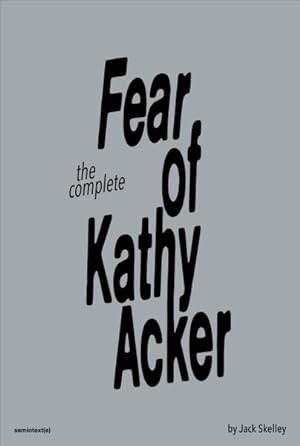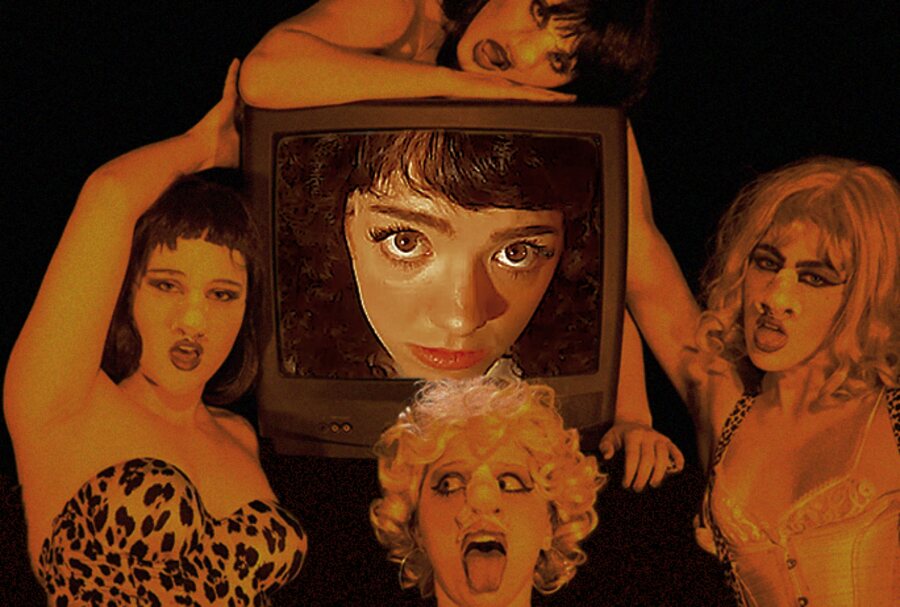“Everything you can think of is true,” goes a Tom Waits lyric I find equal parts inspiring and chilling. It’s a line I thought of frequently while reading my old friend Jack Skelley’s trippy picaresque Fear of Kathy Acker, a channel-surfing fusillade of sex, self-loathing, and deadpan humor he originally wrote four decades ago, when he was a poet and musician on Los Angeles’s punk and alternative literary scenes. (We met not long after, when he was my editor at the L.A. Downtown News.) Fear of Kathy Acker’s anxious romp through Skelley’s pop-culture-warped consciousness, rife with jarring juxtapositions and tonal shifts, crudity and profundity, imagined dialogue and interior monologues, is both a kind of literary stunt—trolling before it had a name—and a deeply felt pushback against the tide of Reagan-era consumerism and sellout.

Its uncanny mix of transgression and sincerity may partly account for the book’s miraculous resurgence in the past year, and its unlikely embrace by L.A.’s current alt-lit scene. Published in full for the first time last June as The Complete Fear of Kathy Acker by Semiotext(e), a small but influential West Coast press run by Chris Kraus and Hedi El Kholti, it has achieved niche hit status and is now in its third printing. Even more remarkably, as an article earlier this year in Paper magazine put it, this lost ’80s classic by a straight white man now in his 60s has “emerged as a symbol for a new generation of writers and artists, many of whom are young, women and queer.”
One of those women is Siena Foster-Soltis, a director and theatremaker who has turned Fear of Kathy Acker into a play with her L.A. company Conjugal Visit; it runs for three nights next week, Feb. 27-29, at Santa Monica’s Illusion Magic Lounge. Featuring a cast entirely comprising women and nonbinary folks, the play, Soltis-Foster said in a recent interview along with Skelley, is inspired as much by the book itself as by the phenomenon of its belated embrace.
“A large part of this production of Fear of Kathy Acker is both the actual scenes within the source text that happen as part of Jack’s psyche, but also the modern-day interpretation of the book and references to its relevance and currency today,” said Foster-Soltis, whose previous work with Conjugal Visit included last year’s interactive Contrition Pageant. She’s even inserted herself into the show “as a young woman who’s reading this book,” and the script makes room for “other young women’s reactions” to the source.
Some of those reactions, she admitted, involve “a level of hostility that I think is almost unavoidable when taking something that is a hetero male-centric voice and trying to merge it somehow with a young woman’s voice.” Rather than skirt that discomfort, she said she’s tried to “harness that hostility” and bring it into the play. “There’s also a weird trap there,” she continued. “It’s easy to get overly hostile, to a point where it becomes like a riot piece, or to go the other way, where you’re just completely playing into it, like, ‘We’re sexy girls doing sexy things onstage.’ There’s a line in between where it’s like: I endorse it and critique it at the same time. That’s a line we try to ride.”

Still, the mind reels at the possibilities. How will Foster-Soltis and her co-director, Rory James Leech, stage the book’s opening chapter, “Sexy Day,” for instance, with its matter-of-fact toggling between stickily explicit lingerie fantasies and banal musings about L.A. malls and Dodgers tickets? Or how about the memorable (imaginary) scene in which a giant avatar of porn star Amber Lynn fucks the skyscrapers of Downtown L.A.?
Buzzy as that material is, that’s not what chiefly drew her to Skelley’s writing, Foster-Soltis said.
“The main thing that resonated with me in The Complete Fear of Kathy Acker wasn’t the sex stuff at all,” she said. “Not that I didn’t like the sex stuff, but it was all the self-loathing and self-critique, often in a really comical way—this deep acid flashback of self-hatred, this nihilistic take on the overly consumerist, capitalist surge of the ’80s, which I think people relate to today.”
Indeed, while Skelley’s book sifted with rueful glee (or is that gleeful rue?) through the flotsam of the age of television, long before the internet and social media, and Foster-Soltis grew up with the iPhone, she found common ground in such passages as the following:
Language exists to fuck society’s constrictions up the butt. Language is the tool of the visionary, the anarchist, the child, the artist, the saint, the lover and Bob Flanagan. Everything else which sounds like Language but is really words used to corrupt people or chop them into little bite-size pieces is not Language, but Clop. Clop is something people swallow to kill themselves. It’s a detergent washing life away. It is sets of word-images that hold people’s minds in one spot for 2.5 seconds until another set of Clop words is introduced.
If that’s not a prophecy of social media, I’ll eat my Instagram. Skelley concludes Fear of Kathy Acker with a fearful, resigned look ahead to the millennium. I wondered how things look to him as we’re well past that and into a new century.

“I’m glad that Siena kind of fixated on the more anxious, dark passages of the novel,” Skelley told me, “even though a lot of it is very funny and a lot of it is very sexy. The book is a lot about consumer society, capitalist society, apprehending the functions of the culture—particularly electronic media, which was just basically TV at the time—and inflicting its force on the populace in very insidious ways. That really scared me. Looking on the other side of that, if anything, it’s just gotten worse, the way these societal norms, materialism, gender norms, every sort of problem that we have is filtered through media and foisted upon people. I don’t even know how young people can stand it, honestly.”
One way they withstand it, of course, is to make art about it, as Foster-Soltis and her colleagues are doing. Or, as Skelley put it at one point in Fear of Kathy Acker, quoting a beloved L.A. bard:
Lewis MacAdams said poets will never fucking shut up. No matter how much you imprison, torture, suppress or bore them. Even here in America the vast majority of word-smiths are in the decadent service industries—in advertising and promotion and disinformation—even where most writers are employed by the Megacorporate conglomerates, even here the writers will not shut up. The more the conglomerates try to shut them up the louder they’ll shout, the more they’ll rant about.
There’s bleak hope in that, I think. I wondered what Jack—who said that while Foster-Soltis has shown him some drafts of her “wild” script, he has been “banned from rehearsals”—thinks about the prospect of watching his book take on another life onstage. He has done public readings from it over the years (including at last year’s book release party), so it has been performed, in a sense, but never quite like this.
“I’m totally freaked out,” he said with a nervous titter. “Siena has told me that the actor playing me, Magdalene Cherry, is a Method actor and has been studying videos of my mannerisms. She kind of even looks like me in one of the photos. It’s weird.”
Maybe not as weird as the passage in Fear of Kathy Acker in which he claims that Loni and Laurie Anderson are in fact the same person, but it’s in the ballpark.
If you’re wondering about the title of the book and the play: They have about as much to do with the punk-rock postmodernist known for her appropriative techniques as Edward Albee’s most famous play has to do with Virginia Woolf. But Skelley certainly took inspiration from Acker, he said, and from women writers in general—another reason, he guesses, that his book may be resonating with women and femmes.
“I don’t pretend to understand, and I certainly did not expect the book to have, the reaction it’s gotten,” he said. “If anything, I was expecting a backlash to it, or even worse, to be ignored completely. But it comes from a love of Kathy Acker’s writing and the writing of other transgressive women. I just love women’s writing—écriture féminine, that’s the term used in French theory. Women have urges and needs too. Why can’t we just all have them?”
Indeed, with a play based on his writing, Skelley is right back where he has so often been before: just looking forward to another opening.
Rob Weinert-Kendt is editor-in-chief of American Theatre.


